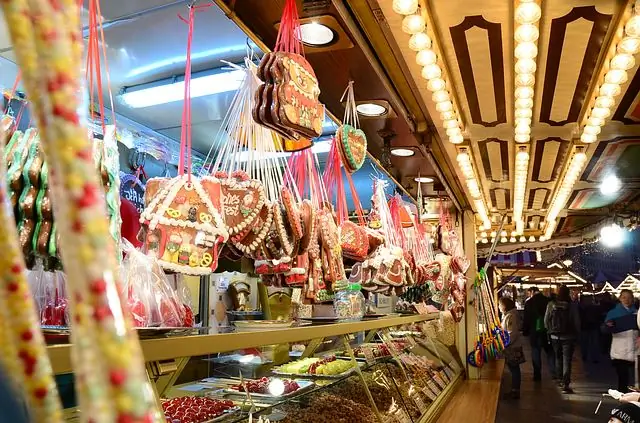- Author Caroline Forman [email protected].
- Public 2023-12-16 11:46.
- Last modified 2025-01-23 09:54.
The main winter holiday in Germany is Christmas. However, the Germans willingly have fun on New Years, which they call Sylvester. The New Year's holiday received such a second name in honor of St. Sylvester I, who died on December 31, back in 335.

At the end of December, winter holiday fairs are still open in many German cities. Therefore, most of the Germans prefer to celebrate the New Year in such places. The fairs are always fun and noisy, it smells like gingerbread and mulled wine. There are animators who entertain children, temporary carousels are open, giant elegant Christmas trees are flaunting.
In Germany, New Year is a holiday that is usually not celebrated in a quiet family circle at a rich table. The celebration usually takes place in the company of friends and acquaintances. Closer to night, the celebrants go out onto the city streets, sing songs, laugh and have fun, launch firecrackers and fireworks into the sky. In Berlin, the capital of Germany, festive processions stretch for several kilometers. And the central square of the city is the place where the most people gather. On New Year's Eve, a powerful colorful fireworks are organized in the German capital, which lasts at least an hour.
Throughout the New Year's Eve, cafes, restaurants, and various nightlife establishments operate in German cities.
Celebrating a holiday at home, the Germans never forget about the old New Year's tradition. With the first strike of the clock, they climb with their feet on the chairs, and with the last strike, they jump to the floor, as if "bursting" into the new year. At this moment, it is customary to loudly congratulate everyone around on the holiday and drink champagne.
Traditional German wish (toast) for the New Year: "Prost Neujahr". Literally it can be translated as "successful (successful) New Year".
Among the variety of treats on New Year's Eve in Germany, the traditional home-made gingerbread is especially appreciated. It is baked with raisins and a lot of sugar. In addition, a basket with fresh apples and nuts always flaunts on the New Year's table. Germans believe: if you eat an apple on a festive night, you will be able to learn the truth, and learning something in the coming year will be easy and simple. Nuts, which should also be tried on New Year's in Germany, symbolize victory over problems, easy overcoming of obstacles.
On New Year's Eve, German children receive gifts in the same way as on Christmas. The main New Year character in Germany is Weinachtsman. Visually, he looks a bit like Santa Claus, only wears a fur coat turned inside out, girded with a massive chain. Weinakhtsman has a rod in his hands - for naughty children, a huge bag of gifts - for those who behaved well all year. Together with him, Christkind, a young maiden in white clothes, whose face is covered with a snow-white veil, comes to visit the German children. She brings with her a wicker basket of ripe apples and nuts, which Christkind distributes to the children. In order for a child to receive a gift from New Year's characters, he needs to tell a rhyme or sing a song.
The most popular New Year gifts in Germany are books. Collector's editions, illustrated stories, comics, collections of fairy tales, detective collections or anthologies of horror literature - all this is customary to donate to Sylvester in Germany. Another traditional gift for the New Year is tickets for an event or a trip to another country.






